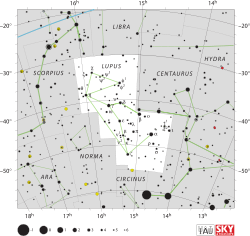Gamma Lupi

| |
| Observation data Epoch J2000.0 Equinox J2000.0 | |
|---|---|
| Constellation | Lupus |
| Right ascension | 15h 35m 08.44835s[1] |
| Declination | –41° 10′ 00.3247″[1] |
| Apparent magnitude (V) | 2.77[2] |
| Characteristics | |
| Spectral type | B2 IV[3] |
| U−B color index | –0.82[4] |
| B−V color index | –0.20[4] |
| Astrometry | |
| Radial velocity (Rv) | +2.3[5] km/s |
| Proper motion (μ) | RA: −15.62[1] mas/yr Dec.: −25.43[1] mas/yr |
| Parallax (π) | 7.75 ± 0.50[1] mas |
| Distance | 420 ± 30 ly (129 ± 8 pc) |
| Absolute magnitude (MV) | –2.4[2] |
| Orbit[6] | |
| Period (P) | 190.0 yr |
| Semi-major axis (a) | 0.655" |
| Eccentricity (e) | 0.51 |
| Inclination (i) | 95.0° |
| Longitude of the node (Ω) | 94.6° |
| Periastron epoch (T) | 1885.0 |
| Argument of periastron (ω) (secondary) | 311.5° |
| Details | |
| γ Lup A | |
| Mass | 9.5 ± 0.2[3] M☉ |
| Luminosity | 5,000[2] L☉ |
| Surface gravity (log g) | 3.96[2] cgs |
| Temperature | 20,900[2] K |
| Rotational velocity (v sin i) | 270[7] km/s |
| Age | 18.6 ± 2.4[3] Myr |
| Other designations | |
Gamma Lupi (γ Lupi, γ Lup) is a 3rd-magnitude, B-type blue giant star in the constellation of Lupus. It is also known in ancient Chinese astronomy as 騎官一 or "the 1st (star) of the Cavalry Officer". With a telescope, Gamma Lupi can be resolved into a binary star system in close orbit. This is known as the Gamma Lupi AB system, often abbreviated as γ Lupi AB or γ Lup AB. Gamma Lupi A is itself a spectroscopic binary with a period of 2.8081[9] days.
This star is a proper motion member of the Upper-Centaurus Lupus sub-group in the Scorpius-Centaurus OB association, the nearest such co-moving association of massive stars to the Sun.[2]
See also
References
- 1 2 3 4 5 van Leeuwen, F. (November 2007), "Validation of the new Hipparcos reduction", Astronomy and Astrophysics, 474 (2): 653–664, arXiv:0708.1752
 , Bibcode:2007A&A...474..653V, doi:10.1051/0004-6361:20078357
, Bibcode:2007A&A...474..653V, doi:10.1051/0004-6361:20078357 - 1 2 3 4 5 6 de Geus, E. J.; de Zeeuw, P. T.; Lub, J. (June 1989), "Physical parameters of stars in the Scorpio-Centaurus OB association", Astronomy and Astrophysics, 216 (1-2): 44–61, Bibcode:1989A&A...216...44D
- 1 2 3 Tetzlaff, N.; Neuhäuser, R.; Hohle, M. M. (January 2011), "A catalogue of young runaway Hipparcos stars within 3 kpc from the Sun", Monthly Notices of the Royal Astronomical Society, 410 (1): 190–200, arXiv:1007.4883
 , Bibcode:2011MNRAS.410..190T, doi:10.1111/j.1365-2966.2010.17434.x
, Bibcode:2011MNRAS.410..190T, doi:10.1111/j.1365-2966.2010.17434.x - 1 2 Johnson, H. L.; et al. (1966), "UBVRIJKL photometry of the bright stars", Communications of the Lunar and Planetary Laboratory, 4 (99), Bibcode:1966CoLPL...4...99J
- ↑ Evans, D. S. (June 20–24, 1966), Batten, Alan Henry; Heard, John Frederick, eds., The Revision of the General Catalogue of Radial Velocities, University of Toronto: International Astronomical Union, Bibcode:1967IAUS...30...57E
- ↑ Hartkopf, W. I.; Mason, B. D.; Worley, C. E., Sixth Catalog of Orbits of Visual Binary Stars, retrieved 2010-11-10
- ↑ Bernacca, P. L.; Perinotto, M. (1970), "A catalogue of stellar rotational velocities", Contributi Osservatorio Astronomico di Padova in Asiago, 239 (1), Bibcode:1970CoAsi.239....1B
- ↑ "HD 138690", SIMBAD Astronomical Object Database, Centre de Données astronomiques de Strasbourg, retrieved 2007-01-18
- ↑ Pourbaix, D.; et al. (2004), "SB9: The ninth catalogue of spectroscopic binary orbits", Astronomy and Astrophysics, 424 (2): 727–732, arXiv:astro-ph/0406573
 , Bibcode:2004A&A...424..727P, doi:10.1051/0004-6361:20041213
, Bibcode:2004A&A...424..727P, doi:10.1051/0004-6361:20041213
This article is issued from Wikipedia - version of the 3/13/2015. The text is available under the Creative Commons Attribution/Share Alike but additional terms may apply for the media files.